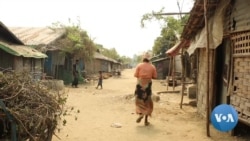ມີພວກຊົນກຸ່ມນ້ອຍ ຊາວໂຣຮິງຢາ ປະມານ 700,000 ຄົນ ຫຼົບໜີຈາກມຽນມາເຂົ້າໄປ ໃນບັງກລາແດັສຫຼັງຈາກໄດ້ມີການປາບປາມໂດຍກຳລັງທະຫານຢ່າງໂຫດຮ້າຍທີ່ເລີ້ມ
ຂຶ້ນໃນເດືອນສິງຫາ ປີ 2017 ຢູ່ທີ່ລັດຣາໄຄນ໌ ທາງພາກຕາເວັນຕົກສຽງເໜືອຂອງປະ
ເທດ. ແຕ່ສຳລັບຊາວໂຣຮິງຢາຫລາຍກວ່າ 120,000 ຄົນທີ່ຍັງເຫຼືອຢູ່ໃນປະເທດມຽນ
ມາແມ່ນມີຊີວິດ ບໍ່ຄ່ອຍແຈ່ມ ໃສປານໃດ ແລະຫຼາຍໆຄົນ ແມ່ນມີຄວາມຢ້ານກົວ ກ່ຽວ
ກັບ ອະນາຄົດຂອງ ພວກເຂົາເຈົ້າ. ລັດຖະບານມຽນມາ ກ່າວວ່າ ຕົນຢາກຈະປິດສູນ ພວກອົບພະຍົບ ພາຍໃນປະເທດ ຊາວໂຣຮິງຢາ ແຕ່ພວກເຂົາເຈົ້າຈະບໍ່ໄດ້ຮັບອະນຸ
ຍາດໃຫ້ ກັບຄືນໄປຫາ ເຮືອນຊ້ານບ້ານຊ່ອງ ທີ່ພວກເຂົາເຈົ້າໄດ້ຫຼົບໜີມາ. ວີໂອເອ
ມີລາຍງານຈາກລັດຣາໄຄນ໌ ຂອງມຽນມາ ດັ່ງໄພສານຈະນຳເອົາລາຍລະອຽດມາສະ
ເໜີທ່ານໃນອັນດັບຕໍ່ໄປ.
ນີ້ແມ່ນສູນອົບພະຍົບຜູ້ປະສົບໄພພາຍໃນປະເທດແຫ່ງນຶ່ງຂອງຈຳນວນທັງ ໝົດ 18
ແຫ່ງ ທີ່ຊາວໂຣຮິງຢາ ແລະຊາວມຸສລິມອື່ນໆ 120,000 ຄົນ ອາໄສຢູູ່ ນັບແຕ່ບ້ານ
ເຮືອນຂອງພວກເຂົາເຈົ້າ ໄດ້ຖືກຈູດເຜົາໂດຍພວກຊາວພຸດ.
ຊາວໂຣຮິງຢາ ທີ່ຖືກປະຕິເສດຕໍ່ການໃຫ້ສັນຊາດນັ້ນ ໄດ້ອາໄສຢູ່ໃນສະພາບທີ່ຄ້າຍ
ຄືກັນກັບຄຸກ ໂດຍບໍ່ມີຊ່ອງທາງເຂົ້າເຖິງການປິ່ນປົວ ວຽກເຮັດງານທຳ ຫຼືແມ່ນກະທັງ
ການສຶກສາ.
ພວກແມ່ຍິງ ແລະເດັກນ້ອຍແມ່ຍິງ ແມ່ນໄດ້ຮັບຜົນກະທົບເປັນພິເສດຕໍ່ການຈຳກັດ
ຮັດແຄບດັ່ງກ່າວ. ໃນແຕ່ລະມື້ພວກເຂົາເຈົ້າຕ້ອງໄດ້ດີ້ນຮົນຂົນຂວາຍຍ້ອນສະພາບ
ການຂາດແຄນ ຢ່າງຮ້າຍແຮງ ທາງດ້ານອະນາໄມ ແລະ ສະພາບການ ດ້ານສຸຂາພິ
ບານ.
ຜູ້ເປັນແມ່ຊາວໂຣຮິງຢາຄົນນຶ່ງກ່າວວ່າ ສຳລັບພວກເຮົາແລ້ວ ການອາໄສຢູ່ໃນສູນ
ແມ່ນຫຍຸ້ງຍາກຫຼາຍ. ສະພາບຢູ່ໃນສູນແມ່ນມີຜົນກະທົບຢ່າງງ່າຍດາຍຕໍ່ສຸຂະພາບ
ຂອງພວກເຮົາ ແຕ່ຢູ່ທີ່ນີ້ ແມ່ນຍາກຫຼາຍ ທີ່ຈະໄດ້ຮັບການປິ່ນປົວ ທາງດ້ານການ
ແພດ. ມັນບໍ່ມີທ່ານໝໍເລີຍ. ຖ້າແມ່ຍິງຖືພາຫາກປະສົບກັບບັນຫາໃນການຄອດລູກ
ແລະຕ້ອງການຢາກໄປເຂົ້າສຸກສາລາ ນາງສາມາດທີ່ຈະສູນເສຍລູກຂອງນາງກໍເປັນ
ໄດ້.
ຜູ້ນຳທີ່ແທ້ຈິງຂອງມຽນມາ ທ່ານນາງອອງຊານ ຊູຈີ ແລະລັດຖະບານຂອງທ່ານນາງ
ກ່າວວ່າ ພວກຕົນໄດ້ປະຕິບັດຕາມ ຄໍາແນະນໍາ ຂອງ ກໍາມາທິການສາກົນທ່ານໂຄຟີ
ອານັນ ຊຶ່ງຮວມທັງການລົງທຶນໃນດ້ານພື້ນຖານໂຄງລ່າງ ເພື່ອຊ່ວຍຍົກລະດັບການ ເປັນຢູ່ຂອງທັງປະຊາຄົມຊາວໂຣຮິງຢາແລະຊາວພຸດ ໃຫ້ຫຼຸດພົ້ນຈາກຄວາມທຸກຍາກ.
ແຕ່ພວກຊາວໂຣຮິງຢາ ແລະກຸ່ມປົກປ້ອງສິດທິມະນຸດ ໄດ້ຕ້ອງຕິລັດຖະບານກ່ຽວກັບ
ນະໂຍບາຍໃນປັດຈຸບັນທີ່ພວກເຂົາເຈົ້າເວົ້າວ່າ ມີແຕ່ຈະແກ່ຍາວການແບ່ງແຍກແລະ
ບໍ່ໄດ້ເພັ່ງເລັງໃສ່ການເຈລະຈາ ໃນເລື້ອງສັນຊາດ. ພວກເຈົ້າ ໜ້າທີ່ໃນເວລານີ້ ພວມ
ສ້າງເຮືອນຢູ່ຖາວອນ ຕິດກັບຮົ້ວ ຂອງສູນ ແລະຢູ່ໃນ ເຂດທີ່ມັກຈະເກີດນ້ຳຖ້ວມ.
ການດີ້ນຮົນຕໍ່ສູ້ ເພື່ອຄວາມຢູ່ລອດຈາກສະພາບທີ່ສິ້ນຫວັງໃນສູນ ເຮັດໃຫ້ພວກແມ່
ຍິງບາງຄົນຕ້ອງໄດ້ດຳເນີນການແບບບໍ່ຄາດຝັນສຳລັບພວກເດັກນ້ອຍຂອງເຂົາເຈົ້າ
ທີ່ຈະຕ້ອງໄປໂຮງຮຽນ ຊຶ່ງພວກເຂົາເຈົ້າຈະນໍາເອົາບັດປັນສ່ວນອາຫານ ໄປຂາຍໃຫ້
ອົບພະຍົບຄົນອື່ນໆຢູ່ໃນສູນ ແລະບໍ່ໄດ້ກິນອາຫານເລີຍ.
ຜູ້ເປັນແມ່ຊາວໂຣຮິງຢາຄົນນຶ່ງ ກ່າວວ່າ ການອາໄສຢູ່ໃນສູນ ກໍໍບໍ່ຕ່າງຫຍັງກັບອາໄສ
ຢູ່ໃນຄຸກຫຼືສະຫະກອນໄກ່ ມັນບໍ່ເໝາະສົມສຳລັບພວກໄວລຸ້ນ ພວກພໍ່ແມ່ ທີ່ແຕ່ງງານ
ແລ້ວ ແລະພວກຜູ້ເຖົ້າຜູ້ແກ່ ທີ່ຕ້ອງໄດ້ຢູ່ແຕ່ໃນຫ້ອງນ້ອຍໆ.
ຜູ້ເປັນແມ່ຫຼາຍໆຄົນກ່າວວ່າ ຄວາມຫວັງຢ່າງນຶ່ງຂອງພວກເຂົາເຈົ້າກໍແມ່ນເພື່ອ ພວກ
ເດັກນ້ອຍ ທີ່ຈະໄດ້ດຳລົງຊີວິດແບບສະຫງົບ ຢູ່ໃນຊຸມຊົນຄືນອີກ.
Some 700,000 ethnic Rohingyas have fled Myanmar for Bangladesh following a brutal military crackdown that began in August 2017 in northwest Rakhine state.But for the more than 120,000 Rohingya who remained in Myanmar, life is grim and many fear for their future. Myanmar's government says wants to close the camps for these internally displaced Rohingya but they will not be allowed to return to the homes they had fled.From reporting done in Myanmar's Rakhine state, VOA has this report narrated by Katherine Gypson.
This is among the 18 camps where 120,000 Rohingya and other displaced Muslims have had to live after their homes were razed by Buddhist mobs.
Denied citizenship, the Rohingya live in prison-like conditions, with no access to healthcare, work or education.
Women and girls are especially affected by restrictions.They face daily struggles because of the acute hygiene and sanitation conditions.
Rohingya Mother:
"For us, living in camps is very difficult. Camp conditions easily affect our health but here it's very difficult to get medical treatment here. No doctors are available. If a pregnant woman faces difficulties delivering a baby and needs to look for a clinic - she can lose her baby."
Myanmar's defacto leader Aung San Suu Kyi and her government say they are acting on recommendations handed down by the international advisory Kofi Annan Commission.These include investing in infrastructure to help lift both the Rohingya and Buddhist communities out of poverty.
But the Rohingya and human rights groups have slammed the government for its current policy that they say only entrenches segregation, and does not focus on talks about citizenship.Authorities are currently building permanent housing next to camp fences and in some flood-prone areas.
Struggling to survive the bleak conditions in camps, some women are so desperate for their children to go to school that they will trade their ration cards to other refugees in the camps, and go without food.
Rohingya Mother:
"Living in the camp is like living in a prison or a chicken coop, it's not appropriate for teenagers, married parents and elders to live inside a small room."
Many mothers say their one hope is for their children to live peacefully in the community again.





